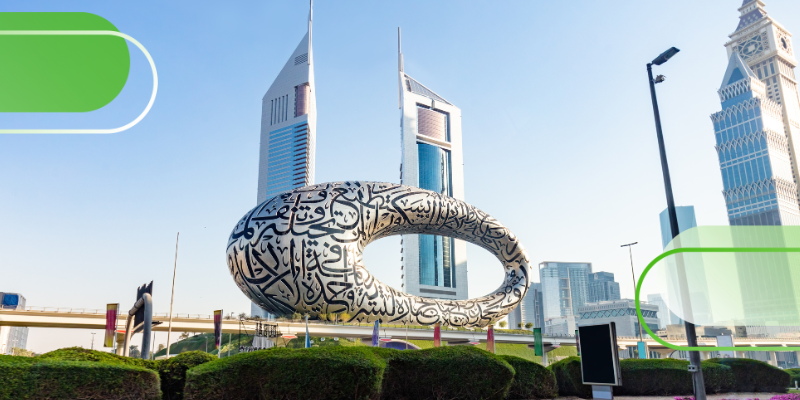eCommerce growth in the United Arab Emirates is experiencing a significant surge, with the country becoming one of the fastest-expanding markets in the Middle East. But what’s driving this boom in the UAE? A key force is the country’s large and diverse expat population. With expats from around the world making up more than 88% of the UAE’s population, their unique shopping habits, preferences, and demands are reshaping the country’s eCommerce industry and creating significant opportunities for online retailers.
From their reliance on online shopping for international goods to their high expectations for fast delivery and digital payment options, expats are fueling this eCommerce boom in ways businesses cannot afford to ignore. In this blog post, we’ll dive into the critical factors behind the growth and show why catering to the expat market is crucial for any eCommerce business, including startups and cross-border eCommerce players, looking to expand in Dubai and across the UAE.

The Rise of eCommerce in the UAE
The UAE’s eCommerce market was valued at approximately $7.5 billion in 2023 and is expected to grow more than 75%, to nearly $13.3 billion, by 2028. Factors such as high internet penetration—more than 99% of the population is online—and the country’s advanced digital payment infrastructure and government initiatives aimed at digital transformation, have laid the groundwork for this boom. And of course, the pandemic accelerated the shift toward online purchases, further embedding online and mobile shopping as a norm in Dubai and across the rest of the United Arab Emirates.
Not to be overlooked is the UAE’s huge expat population, who account for more than 11 million of the country’s 12.5 million residents. Expats, many of whom come from countries where eCommerce is already well established, bring with them a strong demand for online shopping. From purchasing international goods that may not be available locally to relying on eCommerce for convenience and variety, expats have become a powerful force in shaping the UAE’s eCommerce landscape. Their influence is evident not only in the demand for global brands but also in the high expectations for fast delivery, seamless payment options, and personalized online shopping experiences. This makes expats a critical demographic for eCommerce businesses looking to expand their footprint in the UAE.
Demographics of the UAE’s Expat Population
The UAE’s expat population is incredibly diverse, with individuals from all over the world calling the country home. Expats in the UAE encompass various age groups, nationalities, and income levels, collectively influencing the country’s eCommerce trends. A significant portion of expats are well-educated middle- to high-income earners from countries including India, the UK, the Philippines, and Western Europe.
Younger expats, in particular, tend to have a higher disposable income and are more likely to engage with global brands. This makes them the perfect audience for businesses looking to tap into the UAE’s expanding eCommerce market, especially when it comes to key trends like consumer electronics, fashion, and personal care products. Additionally, this group is highly familiar with eCommerce ecosystems in their home countries, and they actively seek online platforms that offer seamless online payment options, a wide range of products, and a user-friendly shopping experience.

How Expats Are Driving eCommerce Categories
Expats in the UAE are driving demand across various eCommerce categories. Electronics in particular is a high-demand category, as expats often look for the latest gadgets, smartphones, and tech accessories. Fashion is another key category, with many expats seeking global and luxury brands that may not be available in local stores. Groceries, especially specialty and imported items, are increasingly being purchased online as expats look for products that remind them of home. Home goods, furniture, and decor are also seeing significant growth as expats settle into new homes.
To source products that are either unavailable or more expensive locally, many expats turn to international online platforms. This is particularly common in niche markets such as beauty products, health supplements, and food items. By shopping across borders, expats can access a wider range of products at competitive prices, which influences the overall eCommerce landscape in the UAE. Additionally, expats often bring cultural influences from their home countries, introducing trends and creating demand for products that may not have been popular before.
How eCommerce Companies Are Adapting to the Expats’ Influence
eCommerce companies, both local and global, are rapidly adapting to cater to the growing expat population in the UAE. International eCommerce giants such as Amazon and other global brands have expanded their footprint in the region, recognizing the enormous demand from expats for a wide variety of global products leading to increased online sales.
However, serving such a diverse expat population presents its own set of challenges. Retailers face language barriers, as the UAE is home to people from a multitude of countries speaking myriad languages. This diversity also brings with it the need for a wide product variety that caters to distinct cultural preferences and dietary restrictions. Localized marketing strategies are crucial for reaching different expat communities, as one-size-fits-all messaging is unlikely to resonate across such a broad audience. Businesses need to be mindful of these nuances to capture the attention of their diverse customer base.
Localization strategies have become a cornerstone of success for eCommerce companies looking to thrive in the UAE. From offering multi-language websites to incorporating preferred payment methods such as regional credit cards and digital wallets, businesses are tailoring their services to the needs of expats. This customization also extends to product variety, where retailers ensure they stock products that meet the tastes and cultural preferences of various expat communities.
Customer service expectations are also evolving, as expats demand high-quality support in their native language. Companies are investing in multi-language support teams and customer service platforms to ensure that queries and concerns are addressed promptly and accurately, with businesses that excel in this area gaining a significant competitive edge.

The Role of Shipping in This New Landscape
Shipping plays a pivotal role in the overall eCommerce experience, especially in a competitive market like the UAE, where expat customers accustomed to seamless logistics in their home countries expect fast, reliable, and affordable delivery options. In an environment where convenience is key, the efficiency of a company’s shipping process can be the difference between gaining a loyal customer or losing one to a competitor.
Expats, particularly those purchasing from international platforms, also have high expectations for transparent and accurate tracking. Knowing where their package is and when it will arrive not only enhances customer satisfaction but also builds credibility for the eCommerce brand. In fact, many expats are more likely to return to an eCommerce site that provides clear delivery timelines and offers multiple shipping options, from express delivery to more cost-effective standard options. Brands that optimize their shipping processes to meet these expectations will find themselves with a loyal, repeat customer base.
Cross-border shipping can be complex, especially when dealing with customs and international regulations. eCommerce businesses that partner with logistics providers experienced in cross-border shipping will have an advantage in ensuring faster delivery times, minimizing delays, and offering competitive rates. In the UAE’s booming eCommerce sector, where expat-driven demand is surging, mastering shipping logistics is vital not just for securing one-time purchases but also for establishing long-term customer loyalty.
Partner with ePost Global
With expats in the UAE outnumbering Emiratis by more than seven to one, they’re undeniably driving the surge in eCommerce sales. Businesses that can effectively cater to their unique shopping habits, preferences, and demand for global products stand to thrive in this dynamic market. As advancements in eCommerce continue to reshape the retail landscape, businesses that stay ahead of these trends will capture significant market share among online shoppers.
With ePost Global’s years of expertise in international logistics and seamless cross-border eCommerce shipping solutions, businesses looking to expand into Dubai, the UAE, and the wider Middle East can do so with confidence. From navigating complex customs regulations to offering competitive shipping rates, ePost Global ensures that your products reach the UAE market efficiently, helping you meet the high expectations of expat consumers.
As the eCommerce industry in the UAE continues to grow, driven by an increasing number of expats and online shoppers, businesses that tailor their offerings and logistics to meet this demand will be well positioned for future success. Whether it’s consumer electronics, personal care products, or global fashion brands, ePost Global specializes in providing the kind of logistical support necessary to optimize your operations in this fast-growing and competitive market. The eCommerce market size in the UAE is expanding rapidly, and with cross-border eCommerce becoming a significant part of the region’s retail landscape, mastering logistics and delivery will be crucial.
If you’re looking to capture this lucrative opportunity and expand your eCommerce business in the UAE, partnering with ePost Global gives you access to the logistical expertise and international reach you need to streamline your global shipping operations. Don’t let shipping logistics slow your growth—contact ePost Global today and position your business for success in the UAE’s dynamic and booming eCommerce market.




